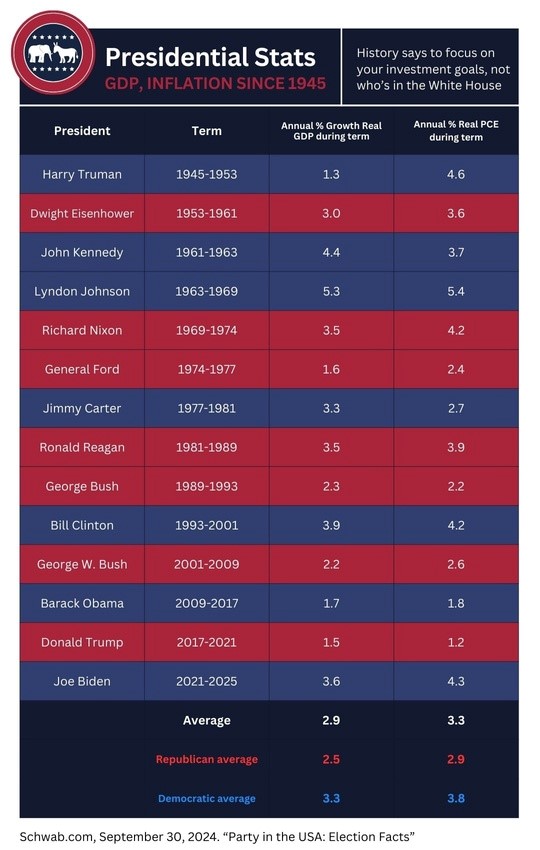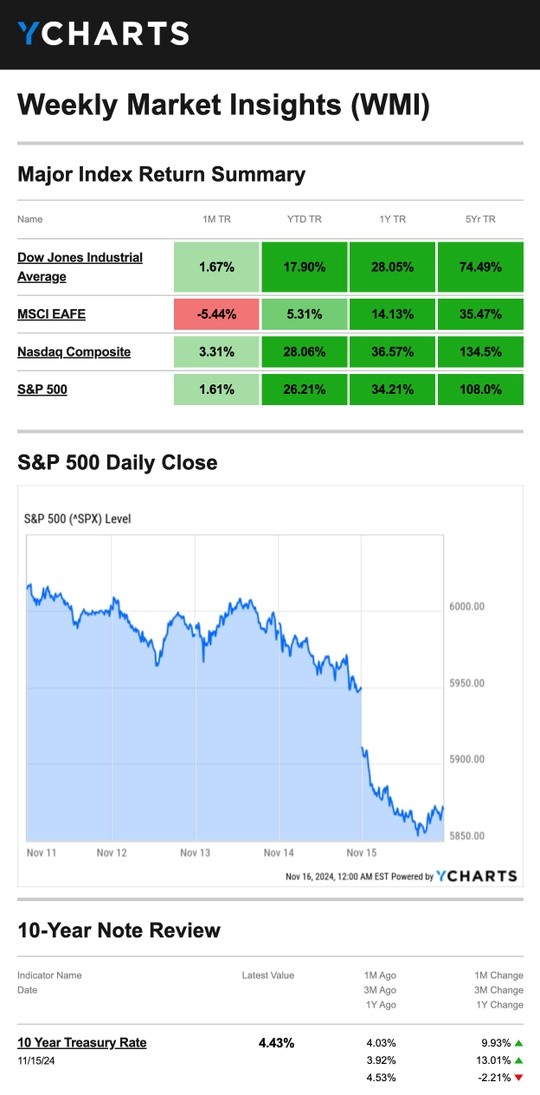Election Update: What’s Next for the Market & Taxes?
One of the more contentious elections in recent years has ended with Donald Trump elected to the first nonconsecutive presidential term since Grover Cleveland in 1892. Similarly, the Republican Party took control of the Senate and House. 1
As you might expect, reactions to these results are varied. It’s safe to say that there may be some market volatility ahead as the nation prepares for the coming transition. You may have many questions about what might happen next.
In the table below, you can see the gross domestic product (GDP) has fluctuated depending on the occupant of the White House, but it has generally trended higher over the long term. The same can be said about inflation, as shown by the Personal Consumption Expenditure price index. It has fluctuated over time but has stayed in a range over the long term.

Elections can be consequential, but your investment strategy is built to take the world as it comes and through all sorts of circumstances. Over the course of your life, the people in power will come and go, policies and even laws may change, but your financial life must take it all on.
In the end, though, as we see above, you likely care more about the election results than the markets do.
This is why the advisors at Adams Brown Wealth Consultants are here to answer your questions, big and small, about what the next few years might mean for you and help you understand what this means for your financial landscape. As always, we welcome the opportunity to help you look at the big picture.
1. Cleveland served his first term from 1885 to 1889 and lost reelection to Benjamin Harrison. In 1892, they faced off again, which saw Cleveland return to office. His second term ran from 1893 to 1897.
Market Insights
Stocks fell last week as the postelection rally lost momentum amid an inflation uptick and cautious comments from Fed officials.
The Standard & Poor’s 500 Index fell 2.08 percent, while the Nasdaq Composite Index declined 3.15 percent. The Dow Jones Industrial Average lost 1.24 percent. The MSCI EAFE Index, which tracks developed overseas stock markets, dropped by 2.38 percent.
Stocks began the week with modest gains as all three major indexes hit record highs. News that the Consumer Price Index (CPI) ticked up slightly in October injected some uncertainty into the markets. The Producer Price Index released the following day showed wholesale inflation ticked up last month. While both the CPI and PPI aligned with expectations, investors hoped for better news.
Comments from Fed Chair Powell that the Fed wasn’t “in a hurry” to cut rates were a bit unexpected, which put stocks under more pressure. Stocks dropped again at the end of the week as strong October retail sales seemed to reinforce Powell’s comments about Fed rate adjustments. News that Boston Fed President Susan Collins expressed doubts about what the Fed might do in December, putting further pressure on stocks.

Source: YCharts.com, Nov. 16, 2024. Weekly performance is measured from Monday, Nov. 11, to Friday, Nov. 15.
TR = total return for the index, which includes any dividends as well as any other cash distributions during the period. Treasury note yield is expressed in basis points.
What’s Next for Taxes?
There is talk that the Tax Cuts & Jobs Act (TCJA) of 2017 may get extended.
With Republicans in control of the legislative and executive branches, most agree tax reform will be part of the federal budget process in 2025.
Will the individual income tax rates get adjusted? Will the state and local tax (SALT) deduction remain capped? How about the alternative minimum tax? And what about estate taxes?
We expect some TCJA provisions may get extended, some modified and perhaps others get abandoned as Congress debates the issues. We also anticipate certain corporate tax rules will be revisited, including the qualified business income deduction for 20 percent of qualified pass-through income.
But to better understand the challenge of tax reform, the Tax Foundation estimates that making the individual, business and estate provisions permanent would add about $4.25 trillion to the deficit from 2025 to 2034. Part of Congress’s job will be debating ideas about how to offset any tax law changes.
Source: TaxFoundation.org, November 13, 2024
